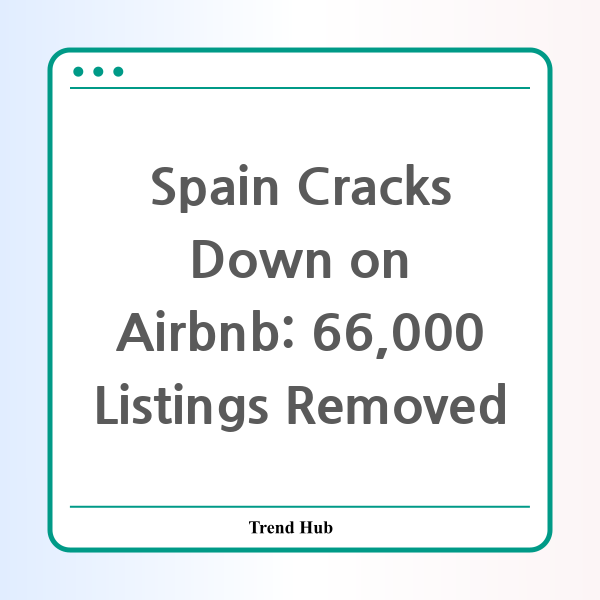* This website participates in the Amazon Affiliate Program and earns from qualifying purchases.

In a bold move aimed at regulating the burgeoning short-term rental market, the Spanish government has ordered Airbnb to take down a staggering 66,000 rental listings. This decisive action has emerged from ongoing concerns regarding housing availability and affordability within major Spanish cities, most notably Madrid and Barcelona.
The announcement underscores a growing trend across the globe where local governments are taking steps to manage the presence of platforms like Airbnb. These measures are not merely administrative; they reflect a broader social imperative to ensure that locals are not displaced due to skyrocketing rental prices linked to holiday accommodations.
According to Spain's Consumer Rights Ministry, many of the listings targeted for removal did not comply with the existing regulations that govern short-term rentals. Issues highlighted include the absence of mandatory license numbers and discrepancies between listed licenses and those registered with local authorities. Such infractions suggest a troubling lack of accountability and oversight within the short-term rental sector.
As cities around the world grapple with similar dilemmas, the case of Spain serves as a critical touchpoint. For instance, Barcelona has already indicated plans to phase out all licensed short-term rentals by 2028 in a bid to safeguard housing for full-time residents. This creates a challenging landscape for platforms like Airbnb, as they navigate both consumer demand for unique travel experiences and the urgent need to respect local housing needs.
Moreover, as Spain faces an ongoing housing affordability crisis exacerbated by the pandemic and increased tourism, more citizens have voiced their frustrations through protests, calling for stricter regulations on holiday rentals. The crux of the debate centers around the essential right to housing versus the burgeoning business of short-term rental accommodations, leading to significant sociopolitical implications.
The government's recent order to Airbnb will be implemented in phases, starting with the immediate removal of approximately 5,800 listings. Subsequent compliance checks are expected to identify additional non-compliant properties until the desired 66,000 removals are achieved. As noted by Consumer Minister Pablo Bustinduy, this initiative aims to eliminate "illegality" within the short-term rental sector and significantly tighten control over these listings.
Airbnb, for its part, has expressed its intention to appeal this order, arguing that the government’s methodology for identifying infringing properties is indiscriminate. The company maintains that many of the listings in question do not require licenses to operate, suggesting a misalignment between government regulations and the actual practices within the rental market.
This situation highlights the delicate balance that must be struck between promoting tourism and preserving local communities. Spain's actions may serve as a model for other countries grappling with similar issues, providing a framework for how to approach the regulation of short-term rentals responsibly and equitably.
As this situation unfolds, both travelers and residents will be watching closely to see how these changes impact the Spanish rental market in the short term, and whether they catalyze broader reforms across the European Union and beyond. Will other nations follow suit in tightening regulations against platforms like Airbnb? Only time will tell.
* This website participates in the Amazon Affiliate Program and earns from qualifying purchases.